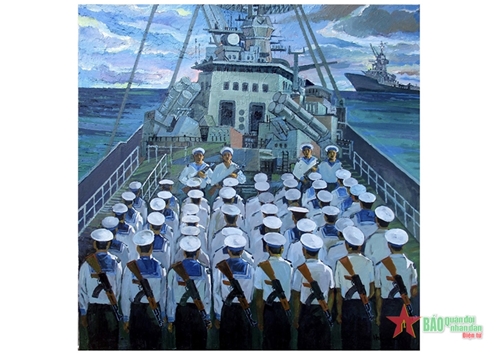In an interview exclusively given to the People’s Army Newspaper’s reporter, Gen. Tuong emphasized that this culture is an important element of Vietnam's sea and island culture and has been continuously built up in line with the development of the nation over thousands of years.
He shared that thousands of years ago, Vietnamese people had close attachment to the sea. He mentioned the legend of Lac Long Quan and Au Co with 50 children following the father to the sea and 50 others going to the mountain with their mother, demonstrating the primitive thinking about conquering the sea, and holding on to the sea of the ancestors.
    |
 |
|
Lt. Gen. Nguyen Ngoc Tuong |
According to the general, many artifacts with boat images found are evidence of the old Vietnamese’s close connection with rivers and seas.
He highlighted the sense of sovereignty and the need to protect activities at sea of the Vietnamese people. As a result, the birth of the navy and naval troops good at naval warfare became a prominent feature in the history of Vietnam’s military organization and military art. He emphasized a number of Vietnam’s feats-of-arms on rivers and at sea in the past; the establishment of checkpoints, the organization of patrols at sea and on islands in the Ly, Tran, Le and Nguyen dynasties. Particularly, Nguyen Lords selected experienced people for the Hoang Sa Fleet to conduct patrols and King Gia Long assigned Hoang Sa Fleet and other naval troops to survey Hoang Sa (the Paracel Islands), measured sea routes, and defend Vietnamese islands to confirm the national sovereignty over the sea and islands. Attentively, in the Nguyen dynasty, coastal people were asked to prepare ships and boats and weapons as reinforcements to fight foreign invaders at sea.
Asked about how the qualities of Uncle Ho’s soldiers, including naval troops, are imbued with the sea and island culture, especially the national maritime sovereignty safeguarding culture, Gen. Tuong said that the first cultural values that naval soldiers have are the love for national sea, islands, hometown, home country and the readiness to sacrifice to safeguard national sea and islands. He underlined that the art of naval warfare of Vietnamese nation is part of the quintessence of the Vietnamese military art, and also part of the culture of the sea and islands.
The general cited Uncle Ho’s teaching to naval troops that they must defense the nation’s long and beautiful coastline. Realizing the state leader’s teaching, naval commandoes trained hard, bravely sank many enemy vessels in the past, successfully opened Ho Chi Minh Trail at sea, contributing to the great victory in Spring 1975, and the national reunification.
In peacetime, all naval troops are aware of the national sacred sovereignty over the sea and islands, determined to safeguard each inch of land and each corner of islands of the nation. They also serve as a firm fulcrum for fishermen to go fishing offshore, giving support to them. In addition, they, together with local people, foster and promote the sea and island culture of the forefathers and consider islands their homes, sea their home towns and comrades and islanders their family members despite challenges, difficulties, and even sacrifice.
    |
 |
|
The painting “Ahead” by painter Ha Huy Chuong |
In the interview, Lt. Gen. Nguyen Ngoc Truong highly praised fishermen who are ordinary laborers at sea but ready to become brave soldiers whenever the Fatherland asks. “It is local people, holding on to the sea with their love and obligation for the national sea and islands, that have become the force protecting national maritime sovereignty,” said Gen. Truong. He added that their presence on trawlers with national flags flying high is seen as the markers affirming national sovereignty over the sea and islands. They have helped guard, provide timely information about developments at sea, and disseminate the Party’s guideline and the State’s policies and laws, contributing to dealing with contingencies at sea, and defending national sovereignty and security at sea.
Given that maritime security issues have been developing complicatedly and unprecedentedly, Gen. Truong affirmed that it is necessary to bring into play the sea and island culture values to arouse pride and love for the sea and islands, and encourage each citizen to contribute their part to the Fatherland construction and defense cause. According to him, movements towards Truong Sa (Spratly Islands), funds for national sea and islands, contests, exhibitions, and twinning programs have shown their efficiency and practical meaning in promoting the values of the culture of defending national maritime sovereignty in particular and the Fatherland in general. He also highlighted studies of scientists and localities in developing sea economy, taking advantage of sea culture coupled with sustainable development to help build all people’s defense disposition in combination with people’s security posture at sea in safeguarding national sovereignty over the sea and islands.
Translated by Mai Huong